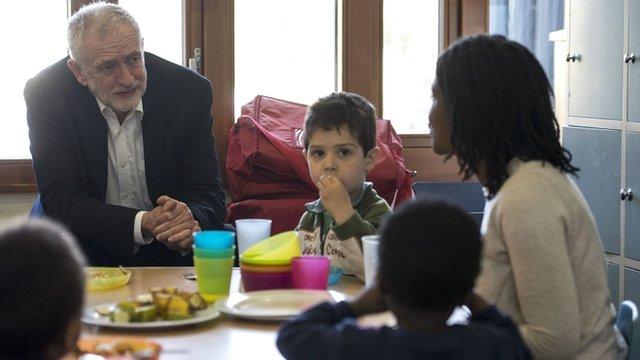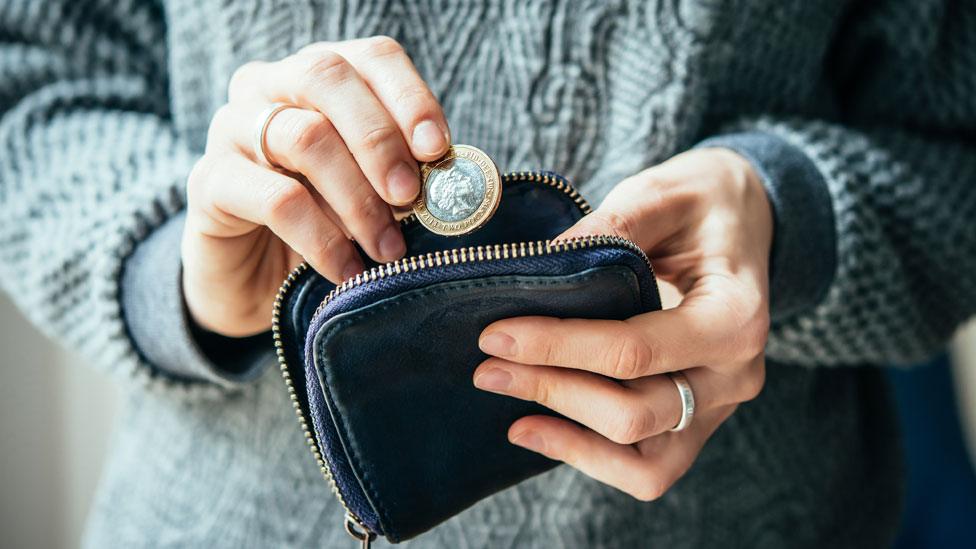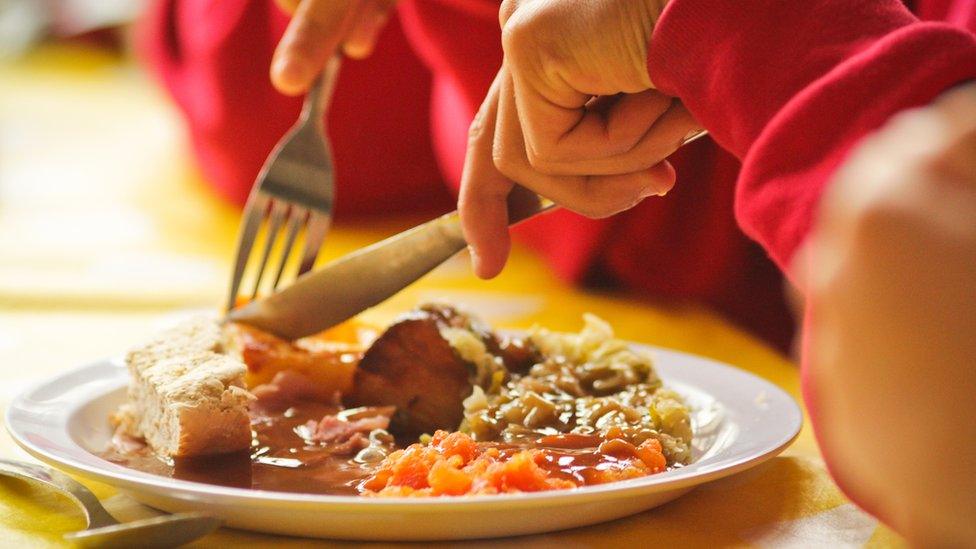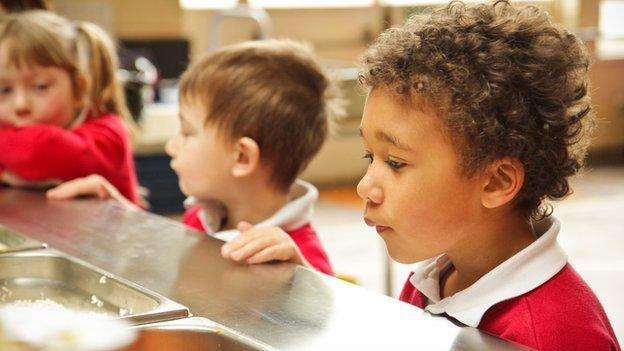Corbyn promises free primary school meals for all
- Published
- comments

Jeremy Corbyn is calling for school meals to be funded by VAT on private school fees
Labour leader Jeremy Corbyn says he wants to extend free school meals to all primary school pupils in England.
Mr Corbyn has proposed covering the cost by introducing VAT on private school fees.
The Labour leader says he has also not ruled out reviewing the charitable status of private schools, which brings them tax advantages.
But the Independent Schools Council said the "sums do not add up" for the proposed charges on private schools.
Mr Corbyn, speaking during a visit to Leyland in Lancashire, presented his free meal plan - but also said that Labour had not ruled out removing the tax breaks from private schools' charitable status.
Tax breaks
"We haven't made a decision on that yet, we are looking at that. The issue we are putting forward at the moment is looking seriously at the question of children's health," said the Labour leader.
"We are considering lots of things but we have not made a decision on that yet.
"Nothing is ruled out, but there are tax breaks that do need to be challenged."
The proposal to fund free meals in primary school from VAT on private school fees was described by Labour as a way of improving the health of many young children by "ending a subsidy to the privileged few".
"We are not proposing to close down private schools or private education, but we are saying we want to raise money to ensure every child gets a decent school meal, and that is the thinking behind this policy," said Mr Corbyn.
All state school educated pupils in the first three years of primary school already receive free meals, under a scheme introduced by the coalition government.
But Mr Corbyn and shadow education secretary Angela Rayner have proposed extending free meals to all primary pupils.
Labour said House of Commons Library figures suggested this would cost £700m to £900m.
Mr Corbyn said this should be funded by higher charges for parents who send their children to private school - and Labour quoted an estimate from the Fabian Society that VAT on private school fees could raise about £1.5bn per year.
"No child in the UK should go hungry at school. By charging VAT on private schools fees, Labour will make sure all primary school children, no matter what their background, get a healthy meal at school," says the Labour leader.
'More work needed'
Labour said there was research evidence showing that universal access to free school meals would raise achievement.
This included a 2012 report from the Institute for Fiscal Studies, evaluating free meal pilot projects, which found "increased attainment in disadvantaged areas" and estimated a national roll-out would cost £1bn a year.
But co-author of the report, Lorraine Dearden, played down the extent of the impact.
Shadow Education Secretary Angela Rayner tells Today free school meals raises attainment
She said there was a "slight improvement" on pupils' attainment, but "we certainly do not know if this impact will replicated nationwide".
There was no change on absences or children's weight, she said.
Mike Buchanan, chair of the The Headmasters' and Headmistresses' Conference, representing leading private schools, said the proposals on fees would hurt "hard working, dual income families who are working very hard".
He said parents sending their children to private school were not the "uber wealthy" and a fifth of these families had incomes less than £50,000 per year.
'Private sector subsidy'
But Ms Rayner said that the private school sector could afford the extra cost - and that many other businesses faced VAT charges.
She said that in a "true meritocracy" the emphasis should be on supporting the 93% of pupils in state schools.
"Why should the state school system subsidise the private sector?" she said.

Most child poverty is now in families where a parent is working
Ms Rayner also highlighted that many working families on low-incomes and in multiple jobs did not quality for free school meals.
Earlier this week, university research argued that take up of free school meals had become an unreliable measure of poverty - because it could miss hardship among those working in low-paid and insecure jobs.
Official figures show that more than two thirds of children living in poverty are now in working families.
Kevin Courtney, leader of the National Union of Teachers, backed Labour's proposals.
"All too often teachers see the impact that hunger has on their pupils. It affects their concentration and ability to learn and their physical and mental health and wellbeing. The benefits of a healthy and nutritious school lunch are well documented," he said.
Sir Michael Wilshaw warns against free meals becoming a subsidy for richer parents
The introduction of free school meals in the first three years of primary school was a policy championed by the Liberal Democrats, under former leader Nick Clegg.
It remains Lib Dem policy to extend free meals to all primary pupils, but they have not supported the proposal to fund this through VAT on private school fees.
Julie Robinson, head of the Independent Schools Council, representing private schools, said the funding proposals did not add up and would hurt hard-working families.
"A third of pupils at our schools are on reduced fees and are from families where both parents work hard to pay the fees," she said.
"If this measure was introduced, smaller independent schools may close, driving more children back to be funded in the state system."
A Conservative spokesman rejected the plan saying Labour's "economic incompetence means this promise isn't worth the paper it's written on".
- Published4 April 2017

- Published28 November 2016

- Published2 September 2014
